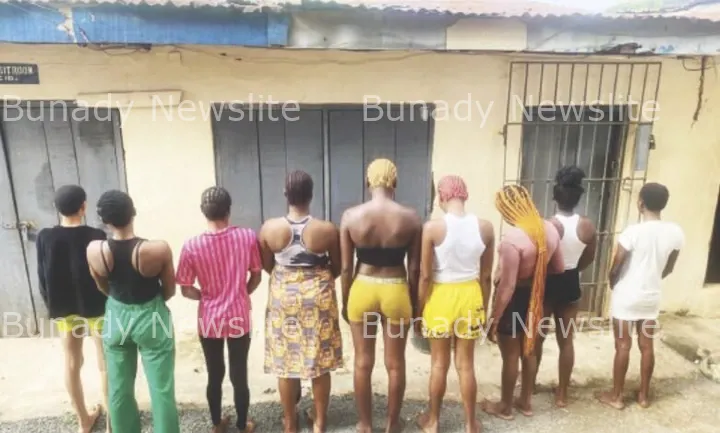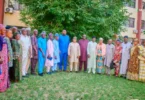The hard times are taking a starkly different toll on people in Nasarawa State, where young females, some as young as 15, are being sucked into immoral transactional relationships, to survive the worsening economic situation unleashed on the nation by the policies of the President Bola Tinubu administration.... CLICK TO READ THE FULL NEWS HERE▶▶
The desperation is palpable, with some women engaging in these encounters for as little as N3,000 and a plate of food. This practice is most prevalent in areas where students reside and there are drinking joints; other locations are where groups of young women can be seen mingling with potential clients.
Traditional decorum appears to have been eroded in these settings. Girls have lost common respect; it is men who now try to maintain some semblance of it. This shift is indicative of the severe economic pressures forcing young women to make difficult choices to survive.
When Sunday Sun visited the bustling Tahiti Street within the polytechnic area of Lafia, Nasarawa State, it was evident that many young women were standing on the streets, calling out to men. Their youthful appearance starkly contrastwd with the grim reality driving their actions. These women, ranging from 15 to 30 years old, include even some married women who have resorted to this means of survival.

In an interview, a young student, name withheld, explained her predicament: “I do it to pay my school fees. My parents are in the village and can’t afford to pay for my education,” Her story is a common one, reflecting the struggles of many young women who face similar circumstances and are forced into precarious situations to secure their future.
Another 16-year-old female, burdened by the responsibility of supporting her family, told Sunday Sun: “We are five at home, I am the last and I am 16 years and my parents can’t take care of all of us, so I have to help myself.”
The economic pressures on large families are immense, often pushing the younger members into these difficult situations. When asked how much she makes in a day, she said: “Sometimes I follow the man to a hotel for N5000, or sometimes N3000 three when there is no market.”
The fluctuating income explains the instability these young women face. A recent graduate from Federal Polytechnic Mubi, Adamawa State, aged 25 years, who chose to remain anonymous, openly discussed her circumstances, revealing the heart-rending situation that drove her to take this option. She said: “I am into hookups to take care of my ailing father who is in the village with a stroke and to cater for my younger siblings,” Her story highlights the heavy responsibilities these young women shoulder, often at great personal cost.
The presence of merchants in town who specialize in arranging these encounters adds another layer to the issue. These merchants collect phone numbers and pictures, some of which are explicit, and connect the women with prospective clients. This commodification of their bodies is a stark and distressing aspect of this practice.
In Akwanga Local Government Area of Nasarawa State, the community’s response to this issue is equally troubling. Mothers casually ask their daughters, “Kin Dawo?” meaning “Are you back? Haven’t slept outside?” This obviously normalizes the practice, reflecting a collective numbness to the underlying economic desperation.
Joy, 26, a student and Benue State indigene at Nasarawa State University, offers a clear example of the harsh reality many face. “I sleep around with men to survive,” she said with a shrug of her shoulders. As a single mother, she juggles her studies with the need to support her aged mother and her baby, who reside in Makurdi.
Sunday Sun gathered that the systemic issues contributing to this situation are complex. Inadequate educational funding, lack of social support systems, and widespread unemployment are significant factors. Young women, disproportionately affected, find themselves with few viable alternatives.
Experts have emphasized the need for a comprehensive approach to address this issue. Improving economic opportunities, providing social safety nets, and offering educational support are crucial steps. Advocacy for better women’s rights and protections are also essential.
A social health worker with the state’ Ministry of Health, Martina Alu, explained that the situation is not only limited to Nasarawa State but is a reflection of the larger societal problem. “This is a national problem. There is a need to address the root cause of poverty and hardship which are driving these girls into hookups.”
The girls are not only risking their health but also their lives. “They are exposed to all sorts of dangers,” said one of the girls. “We can be killed or infected with diseases.”
The men who patronize these girls are also complicit in the problem, Alu posits, stressing, “They take advantage of them. They know they are desperate, and they take advantage of that.”
She added that the situation in Nasarawa State is a reflection of the larger societal problem of poverty and hardship. The girls are desperate and need help. The government and relevant authorities need to step in and provide support for these girls.
Chief Executive of The Beacon Initiative, a non-governmental organization in Nasarawa State, Mr. Emmanuel Envoh, recently addressed this pressing issue, saying: “The economic hardship in Nasarawa is forcing our young women into precarious situations. It’s a tragedy that education and basic needs are so inaccessible that this has become a viable option for survival.”
Envoh emphasized the need for holistic interventions, noting: “We must create more economic opportunities and ensure our young people have access to education and vocational training. Only then can we break this cycle of desperation.”
He also highlighted the role of social support systems, pointing out that “strengthening community-based support networks can provide immediate relief and support for these young girls. Programs aimed at empowering women economically can make a significant difference.”
Envoh called for greater government involvement, stressing that “the government must step up and address these systemic issues with policies that promote job creation and provide financial assistance for education are essential.”
He urged the community to rally together, stating it’s not just a governmental issue; it’s a societal one, adding: “We all have a role to play in supporting these young women and ensuring they have the resources and opportunities they need to survive “











